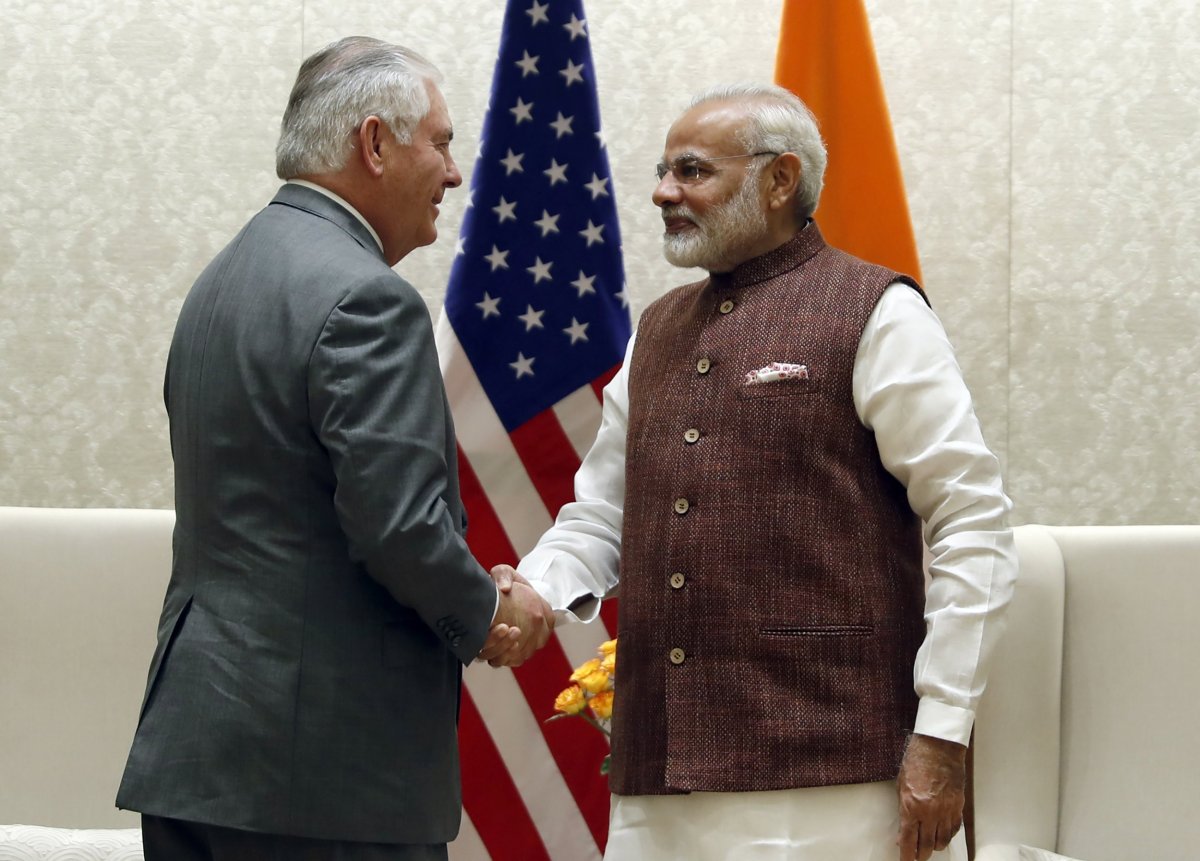This article first appeared on the Riding the Elephant site.
Increasingly wooed by the US as a buffer and ally against the growing might of China, India's balancing act in relation to its bigger and more powerful neighbor has come into sharp focus in the past week.
On Wednesday, Rex Tillerson, the US secretary of State, was in Delhi meeting Prime Minister Modi and other top officials.
He declared that India and US are "natural allies" standing "shoulder to shoulder against terror" with expanding economic and defence ties. "Terrorists' safe havens will not be tolerated," he added, reiterating what he had told Pakistan's army and government during tough talks on Tuesday.
This echoed a key speech he made in Washington on October 18 setting out the Trump administration's heavily pro-India South Asia policy. He was outspokenly critical of China's "provocative actions in the South China Sea" which, he said, "directly challenge the international law and norms that the United States and India both stand for." The US would "not shrink from China's challenges to the rules-based order," or when it "subverts the sovereignty of neighbouring countries."
That indicated support for India against China's cross-border incursions on the Himalayas and for other countries' freedom of navigation and maritime borders, though there were no specifics or indication of a realistic US response.
A day before Tillerson spoke in Washington, China's President Xi Jinping addressed the Communist Party's five-yearly Congress in Beijing with a speech that lasted four and a half hours.

Declaring that the nation "now stands tall and firm in the east," he set out a vision for the middle of the century with China becoming "a global leader in terms of composite national strength and international influence." Key to that is development of Xi's multi-billion dollar One Belt One Road economic trading, transport and pipeline corridor between Asia and Europe that India has boycotted.
And while Tillerson was jetting on from a visit on Monday to Saudi Arabia through Qatar, Afghanistan, Iraq and Pakistan on his way to Delhi, Xi yesterday gained the ranking of China's most powerful leader since Mao Zedong. That was confirmed when "Xi's Thoughts on Socialism with Chinese Characteristics for a New Era" were written into the party's charter.
How India's Narendra Modi must envy Xi's power and authority, which now stretches on to the next Congress in 2022 and possibly beyond, even if Xi then formally retires as president. Modi has to face a general election in 2019 but, before that, needs to ensure that his Bharatiya Janata Party wins regional elections including one in his home state of Gujarat – polling, it was announced today, will take place there in the middle of next month with the vote count on December 18.
Xi now has enhanced authority to continue his adventurist policies with his neighbors, including on the border with India. During the summer, the two countries' armies had a ten-week confrontation with at Doklam, a remote plateau on the their borders with Bhutan. The face-off is officially over, but nothing has been settled and India, which was defeated by China in a brief border war in 1962, expects more incursions in the future.
This adds significance to America's keenness for a close relationship. While that is useful for India, especially in terms of defence supplies, it also poses problems because it seems to increase the likelihood of aggression from China that openly resents the relationship.
Hesitations of history
India and the US have been drawing closer together since Bill Clinton was US president, but Modi began to push it further after he became prime minister in 2014, abandoning what he told the US Congress last year had been the "the hesitations of history".
But, though he has used the word "allies" once, India prefers the less committed approach of a "strategic partnership," with Modi embellishing it to the US being an "indispensable partner."
That means that India will not always toe the American line, as Sushma Swaraj, India's foreign minister, showed in a press conference Wednesday when she rejected suggestions that India should close its small embassy in North Korea and end economic links. Such contacts, she said, were internationally useful as avenues open for talks.
"We'll never have the same relationship with China, a non-democratic society, that we can have with a major democracy," Tillerson said, praising the growing triangular alliance with Japan – plus Australia, though it has yet to decide its position.
He also warned that the US was concerned about the threat that extremist groups pose a threat to the "stability and security" of the Pakistan government.
Overhanging the day, however, was the reality that the credibility of whatever Tillerson said was only a Trump tweet away from being undermined. India – and Pakistan and the other countries he visited – will therefore have taken what he said as the US line for today, with varying prospects of continuity in the future.
Equally, Tillerson was himself constantly aware of being a tweet away from being contradicted by his boss, who he reportedly dubbed a "moron" a few months ago.
So he kept as far away as possible from US reporters travelling with him, fearing any off-the-cuff remark might land him in trouble.
John Elliott writes from New Delhi. His latest book is Implosion: India's Tryst With Reality (HarperCollins).
Uncommon Knowledge
Newsweek is committed to challenging conventional wisdom and finding connections in the search for common ground.
Newsweek is committed to challenging conventional wisdom and finding connections in the search for common ground.
About the writer
To read how Newsweek uses AI as a newsroom tool, Click here.








